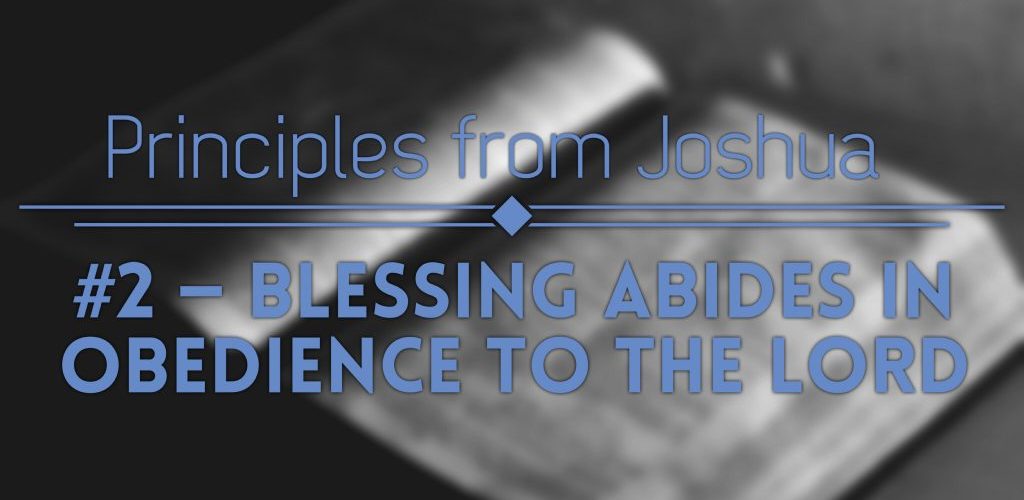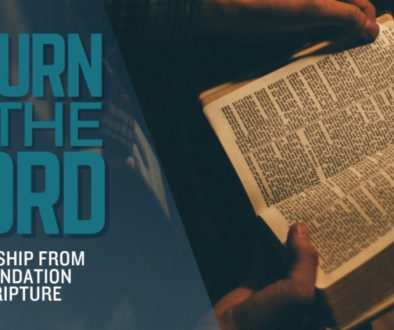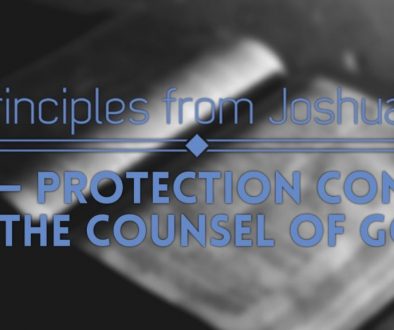If you were to take a cross-cut of Christianity in the world, you would come up with a broad spectrum of viewpoints concerning the finer points of theology and the Christian life. Some of these perspectives are good and some not-so-good; some are on the rise, and some are clearly on the way out. One of these shifts in perspective bothers me often, and I believe is grievous to living out the calling of God in our lives. That is the move away from a focus on the Lordship of Jesus Christ and submission to Him, toward a stronger emphasis on our receiving the blessings of the Lord.
What I mean is that, in far too many Christ circles, of various denominations and cultural settings, there is a major emphasis on “the prosperity gospel.” That is the teaching that says Jesus died simply to make you happy, healthy, and rich. The gospel is about you being blessed, rather than overcoming sin. All-too-often, the same teachers proclaiming the unfettered blessing of the Lord in our lives, who actively downplay the issues of sin and disobedience, as old fashioned and irrelevant.
As we continue to look at the principles we learn from the book of Joshua, we see a truth that stands in stark contrast to this exchange in our focus. That is that God’s blessing abides in obedience to the Lord. If we want to live the blessed life, and see all the prosperity God wants to give to us, then we must learn to walk in submission to Him, and keep His commandments. We will see that, just as in principle number 1, this reality is made explicit not only in Joshua, throughout the Bible.
The Background
This principle pops up in Joshua, very early on, after the people of Israel cross into the promised land. As they claim their inheritance, the first city that they are to conquer is Jericho. God has a very unique plan of attack, and gives Joshua the battle plan. In giving the instructions to Joshua, to destroy the walls of the city and defeat the people, God says, “but you, keep yourselves from the things devoted to destruction, lest when you have devoted them you take any of the devoted things and make the camp of Israel a thing for destruction and bring trouble upon it” (Joshua 6:18).
What God was saying is that all of the spoils of this city were to be sacrificed by the people, unto God. They were to keep nothing back from themselves.
You can think of this as a kind of tithe, as God gave all the spoils from every subsequent city to the people. In making this command, however, God clearly says that if the people claim for themselves anything which God has designated to be destroyed, then that disobedience to His command will infect the camp of Israel, and destine them for destruction as well. Although they were called to be a people blessed by God, He wanted it to be clear that disobedience would remove the blessing.
Selfishness Sets In
Joshua 7 begins by telling us what happened next. “But the people of Israel broke faith in regard to the devoted things, for Achan the son of Carmi, son of Zabdi, son of Zerah, of the tribe of Judah, took some of the devoted things. And the anger of the LORD burned against the people of Israel” (Joshua 7:1).
Of course, Achan did this in secret. He was seeing God’s prosperity coming to them, just as Moses had been prophesying for the last 40 years. “If God wants us to enjoy the fruits of the land,” he seemed to have reasoned, “why would he want this stuff to go to waste?” Surely obtaining the blessing was more important than the obedience thing, right? Surely this was an opportunity from the Lord for Achan to claim his own prosperity, right?
Wrong!
After the battle of Jericho, the next city to be taken down was called Ai. Now, Ai was a small city. Joshua had such confidence that God was giving the land to Israel, that this obstacle didn’t even register as a real threat to him. Instead of sending the full army of the people, Joshua instead commissions a small troop of about 3,000 men to go take the city. However, things turned sour quickly, and the men of Israel were chased away in defeat. Thirty-six dead, and a quick retreat was the result.
Joshua wanted to know why. He hit the floor in prayer, but is quickly rebuked by God! “The LORD said to Joshua, ‘Get up! Why have you fallen on your face? Israel has sinned; they have transgressed my covenant that I commanded them; they have taken some of the devoted things; they have stolen and lied and put them among their own belongings. Therefore the people of Israel cannot stand before their enemies. They turn their backs before their enemies, because they have become devoted for destruction. I will be with you no more, unless you destroy the devoted things from among you…’” (Joshua 7:10-12).
This rebuke is followed by a long process of Joshua bringing the tribes and clans before the Lord, in order to determine, by casting lots, who the perpetrator was. This leads to a strong judgement and even the death penalty for the one who sinned! It also set a major example to the people of Israel, both as individuals and as a nation, that their blessing abides in obedience to the Lord. (They remember back on this incident later in Joshua 22:20, in a call to remain faithful.)
The Principle Made Clear
This is a truth that runs throughout the Bible. From Adam and Eve losing the paradise God gave them by eating a fruit, to Jonah’s very life being consumed by a fish when he refuses to preach grace to some pagans, we see that God works by covenant.
What was that covenant?
Before Moses died, while the people were still in the wilderness, he told the people, “See, I am setting before you today a blessing and a curse: the blessing, if you obey the commandments of the LORD your God, which I command you today, and the curse, if you do not obey the commandments of the LORD your God, but turn aside from the way that I am commanding you today, to go after other gods that you have not known” (Deuteronomy 11:26-28). In fact, that whole chapter is filled with God’s promises of blessing if people obey Him.
Now, I know that we live post-crucifixion. We live in the age of grace, as some call it. And all of that is true. Jesus has died for our sin, and imparted His righteousness to us by faith. Yet, even in the New Testament, we are called to obedience to Christ!
Didn’t Jesus love overcome our disobedience?
Everyone loves John 3:16, which declares the saving love of God in Christ. However, many people move quickly past this scripture a few verses later. “Whoever believes in the Son has eternal life; whoever does not obey the Son shall not see life, but the wrath of God remains on him” (John 3:36). Note that it doesn’t say belief brings eternal life and disbelief brings wrath. It says belief brings eternal life, but if your belief is not followed by obedience then you cannot enter into the blessing. It says wrath “remains” on the one who believe, yet continues in disobedience.
Romans 2:8 repeats this same idea, when the Apostle Paul declares that, “for those who are self-seeking and do not obey the truth, but obey unrighteousness, there will be wrath and fury.” Why? Because even if salvation comes through faith, God’s blessing abides in obedience? If we walk in disobedience to Him, the blessing on our life is automatically removed!
Jesus’ Victory Required Obedience
This concept that blessing abides in obedience, but curses come when we disobey, is not seen anywhere more clearly than in the sacrifice of Jesus. In order to bring about our salvation, and restore all the blessings we lost through sin, He had to defy this principle by living in obedience AND taking the curse of disobedience.
Here’s what that means. We humans try to break the principle by living in disobedience and yet still claiming the right to a blessing. This leads to compounding sin, because when we don’t receive the blessing directly from the Lord, we, just like Achan, decide to bless ourselves.
In order to counteract this compounding sin, Jesus had to do the opposite of what we attempt. He lived in complete obedience to the law and commands of God – something we cannot do. Then, when He deserved all of the blessings for His righteousness, He willingly took our place in the wrath of God, and received the curse for our disobedience.
As the writer of Hebrews says, “Although he was a son, he learned obedience through what he suffered. And being made perfect, he became the source of eternal salvation to all who obey him…” (Hebrews 5:9-10).
The Christian Life Calls for Obedience
Not only did Jesus fulfill our righteousness by His perfect obedience, He also offers His salvation and blessing to those who will obey Him, now.
Jesus wants our obedience. It is actually impossible to live the Christian life without that submission to His commands. He said, “do not think that I have come to abolish the Law or the Prophets; I have not come to abolish them but to fulfill them. For truly, I say to you, until heaven and earth pass away, not an iota, not a dot, will pass from the Law until all is accomplished. Therefore whoever relaxes one of the least of these commandments and teaches others to do the same will be called least in the kingdom of heaven, but whoever does them and teaches them will be called great in the kingdom of heaven” (Matthew 5:17-19).
He even says that our obedience to Him, or lack thereof, is the proof of whether we love Him or not: “Whoever has my commandments and keeps them, he it is who loves me” (John 14:21).
Obedience is even vital in fulfilling the Great Commission Jesus gave to the church! “Go therefore and make disciples of all nations, baptizing them in the name of the Father and of the Son and of the Holy Spirit, teaching them to observe all that I have commanded you. And behold, I am with you always, to the end of the age.” (Matthew 28:19-20).
Our Blessing Abides in Obedience to Him
I believe it is time for us to stop trying to defy this principle. Does God want to bless and prosper HIs people? Yes! Absolutly! However, the Bible makes clear that even for the Christian, our blessing abides in obedience. If we willingly live in sin and selfishness; living for our own passions and trying to bless ourselves, we will not see the blessing of God. Even in our salvation, if we willingly run back to sin, we lose the right to our blessing. This is why Martin Luther said, “The entire life of the Christian is one of repentance.”
When we pray for the sick to be healed, there are many times the person has to repent of sin and unforgiveness before their healing comes. When we do deliverance ministry, before we can effectively cast out the demons, the person must confess of their sins that opened the door to the tormentors. We must return to obedience, in order to regain the blessing!
This principle is not just old fashioned preaching. It is true and relevant to our lives today. If we want to live the blessed life, we must learn to obey the Lord.
So what is your takeaway?
Are you throwing out obedience as “old covenant” and irrelevant? Are you seeking prosperity from the Lord without submission to Him? What is the Holy Spirit speaking to you in all of this? I’d love to hear from you in the comments!
As always, if you are enjoying what you are reading on my blog, I would also be honored if you would subscribe to my weekly email, below. You can also follow me on Facebook and Instagram for regular blog updates, and other ongoing #ChristianLife and #GospelLeadership advice!



